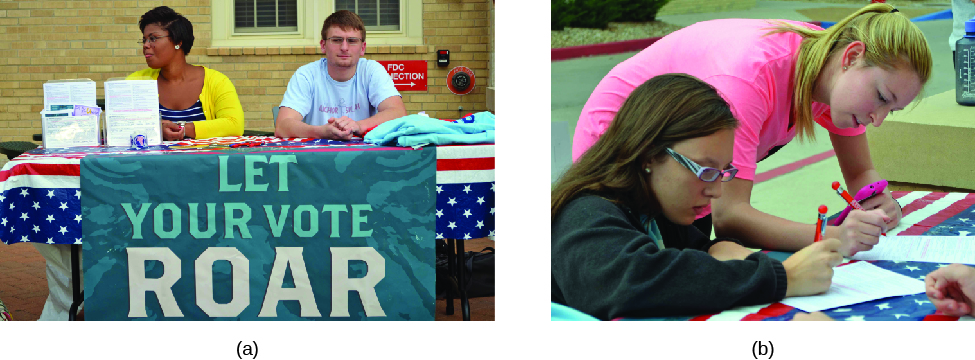WHO IS ALLOWED TO REGISTER?
In order to be eligible to vote in the United States, a person must be a citizen, resident, and eighteen years old. But states often place additional requirements on the right to vote. The most common requirement is that voters must be mentally competent and not currently serving time in jail. Some states enforce more stringent or unusual requirements on citizens who have committed crimes. Florida and Kentucky permanently bar felons and ex-felons from voting unless they obtain a pardon from the governor, while Mississippi and Nevada allow former felons to apply to have their voting rights restored.“Felon Voting Rights,” 15 July 2014. http://www.ncsl.org/research/elections-and-campaigns/felon-voting-rights.aspx. On the other end of the spectrum, Vermont does not limit voting based on incarceration unless the crime was election fraud.Wilson Ring, “Vermont, Maine Only States to Let Inmates Vote,” Associated Press, 22 October 2008. Maine citizens serving in Maine prisons also may vote in elections.
Beyond those jailed, some citizens have additional expectations placed on them when they register to vote. Wisconsin requires that voters “not wager on an election,” and Vermont citizens must recite the “Voter’s Oath” before they register, swearing to cast votes with a conscience and “without fear or favor of any person.”“Voter’s Qualifications and Oath,” https://votesmart.org/elections/ballot-measure/1583/voters-qualifications-and-oath#.VjQOJH6rS00 (November 12, 2015).
Where to Register?
Across the United States, over twenty million college and university students begin classes each fall, many away from home. The simple act of moving away to college presents a voter registration problem. Elections are local. Each citizen lives in a district with state legislators, city council or other local elected representatives, a U.S. House of Representatives member, and more. State and national laws require voters to reside in their districts, but students are an unusual case. They often hold temporary residency while at school and return home for the summer. Therefore, they have to decide whether to register to vote near campus or vote back in their home district. What are the pros and cons of each option?
Maintaining voter registration back home is legal in most states, assuming a student holds only temporary residency at school. This may be the best plan, because students are likely more familiar with local politicians and issues. But it requires the student to either go home to vote or apply for an absentee ballot. With classes, clubs, work, and more, it may be difficult to remember this task. One study found that students living more than two hours from home were less likely to vote than students living within thirty minutes of campus, which is not surprising.Richard Niemi and Michael Hanmer. 2010. “Voter Turnout Among College Students: New Data and a Rethinking of Traditional Theories,” Social Science Quarterly 91, No. 2: 301–323.
Registering to vote near campus makes it easier to vote, but it requires an extra step that students may forget (Figure). And in many states, registration to vote in a November election takes place in October, just when students are acclimating to the semester. They must also become familiar with local candidates and issues, which takes time and effort they may not have. But they will not have to travel to vote, and their vote is more likely to affect their college and local town.

Have you registered to vote in your college area, or will you vote back home? What factors influenced your decision about where to vote?